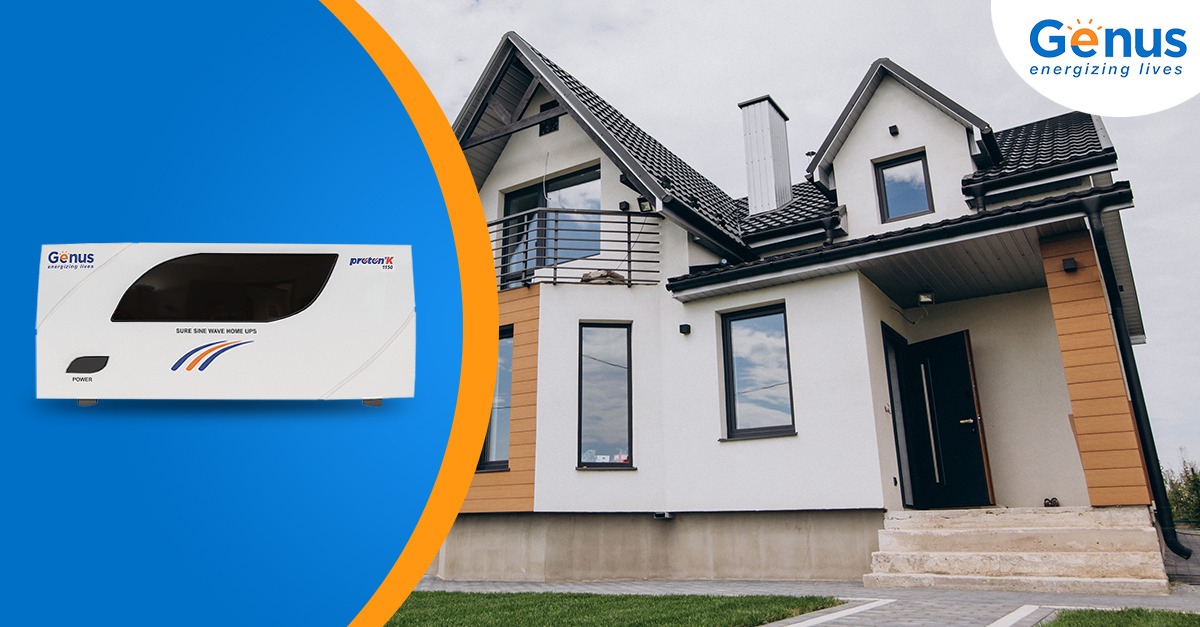
When you are all set to beat the power cut hassles and have selected the best inverter for your home or office, the next question that pops up in your mind is where to place the inverter as the location where you keep the inverter matters a lot. This might sound like a very small detail but your location for solar inverter directly impacts its performance, lifespan and even your electricity savings. This is also very much important to consider when you have space issues.
There is a huge impact of solar inverter installation on its efficiency and also on the conditions in which the inverter is kept. It is very important to carefully plan the inverter setup for home so that the solar inverter can work at its optimum capacity. Yet it is seen that most people take it casually and ignore that impacts the working of their inverter. So today we are going to explain as how to decide the most suitable location for solar inverter so that it can perform at its level best.
Why location of the inverter matters?
When you have made a smart investment in the backup power, it is now important to make sure that it not ends up in the wrong spot else:
- It could overheat
- Safety hazards may arise
- Batteries might degrade faster
- Maintenance might also become a hassle
Since inverters are a basic building block of the solar energy system, the solar inverter installation must be done at the most suitable location.
Factors to choose the best location for solar inverter:
Every solar energy system has inverter as their basic building block. The solar installation should be done at the suitable location so here are the important factors to consider for deciding the best suitable location for solar inverter.
Keep it cool- Ventilation is non-negotiable
Inverters generate heat while they convert DC to AC power and if the space is not properly ventilated, it can reduce the efficiency and can also cause complete shutdown. You need to decide whether to place the inverter indoor or outdoor. For ex: The grid-tied inverters are suitable for outdoor use but they can be installed indoor as well.
Why it matters:
- Efficiency is reduced with excess heat
- This can impact the lifespan of inverter in the long run
- Frequent overheating can also lead to unwanted shutdowns
Pro tip:
- Choose a well-ventilated, shaded area
- Avoid placing it in direct sunlight
- If you are installing it outdoors, ensure there is weatherproof enclosure that is not blocking the airflow
Distance from switchboards and appliances:
The inverter is connected to the main power line of your home and if the wire is longer, the energy loss will also be higher. This is because some voltage drop is always there between the inverter and the panel. It is directly proportional to the length of the wire and indirectly proportional to the wire width.
Best practice:
Try to place the inverter as close as possible to the main power cord (taking care of the safety concern) so the voltage drop could be kept low. This helps reduce the wiring costs, voltage drops and also improves the overall efficiency.
Also Read: A Handy Guide to Solar Panel Wiring
Dry and dust free zone- Protect it from moisture:
Moisture and dirt tend to be the two biggest and silent enemies of your inverter. They creep in slowly (not visibly) and lead to long-term damage. Water and electricity forms a dangerous combo and are not friends. If the inverter is exposed to rain or extreme humidity, it will certainly result in troubles.
Why it matters:
- Moisture results in corrosio of Electrical components get corroded due to moisture
- It can also lead to damage or short circuits
Pro tip:
- Avoid keeping in basements that are prone to flooding
- Keep it away from plumbing lines, water tanks or washing areas
- Use an elevated platform if the floor tends to get dusty or wet
Environmental factors:
Factors like exposure to direct sunlight, temperature, humidity etc. also play crucial role in deciding the location for solar inverter.
Why it matters:
- The efficiency of solar inverter is reduced due to over exposure to sun that leads to overheating of the inverter.
- humidity and water vapors corrode the inverter and affect its lifespan.
Pro tip:
- Try to place the inverter in a shaded area
- Keep it in a cool and properly ventilated place
Also Read: How to Decide the Location and Orientation of Solar Panels ?
Safety of child and elders:
It is important to keep the inverter away from the reach of children and it is also important for the safety of elders.
Why it matters:
- It is important to avoid any kind of possible harm
- Heat dissipation is a part of inverter functioning so that might also pose some risk
Pro tip:
- Make use of an elevated shelf
- Allow some free space for the heat to dissipate
The big debate- Indoor vs Outdoor:
Indoor installations serve better in the case of weather protection while in some cases, outdoor installations tend to be better option.
Also Read: 6 Horrible Mistakes You Can Make While Buying a Branded Inverter
Indoor advantages:
- Protection from dust, heat and rain
- Longer lifespan
- Easy monitoring
Outdoor advantages:
- No hassle of using indoor space
- Easy cable routing from solar panel
Maintenance accessibility:
Inverter should be accessible easily for regular checks, cleaning or troubleshooting. Do not hide it in a corner.
Why it matters:
- Easy maintenance means fewer service delays
- Reduces repair costs
- Allows quick visual inspections
Pro tip:
- Mount it at eye level for easy monitoring
- Keep it properly ventilated and with ease of service access
Don’t settle. Plan.
Do not let convenience steal your peace of mind. Inverter is not just a box with wires. It is the proper partner that lights up the lives of your loved ones. It deserves a home and not a dump.
By keeping in mind the above factors, it becomes easier to find the best location for solar inverter installation at home. The device that comes with warranty of 5-7 years damages soon when the installation is not correct.
So be smart, think ahead and place the inverter where it can breathe, stay cool and protected.
Think safety. Think performance. Think long-term peace.
Choosing the suitable location for your inverter is not just a technical step- it is an investment in performance, safety and peace of mind.
